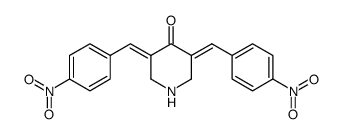919091-63-7
| Name | (3E,5E)-3,5-bis[(4-nitrophenyl)methylidene]piperidin-4-one |
|---|---|
| Synonyms |
3,5-bis(4-nitrophenylmethylene)-4-piperidone
(3E,5E)-3,5-bis(4-nitrobenzylidene)piperidin-4-one (3E,5E)-3,5-bis[(4-nitrophenyl)methylene]-4-piperidone 3,5-Bis-[1-(4-nitro-phenyl)-meth-(E)-ylidene]-piperidin-4-one 3,5-bis(4-nitrobenzylidene)-4-piperidinone RA-9 |
| Description | RA-9 is a potent and selective proteasome-associated deubiquitinating enzymes (DUBs) inhibitor with favorable toxicity profile and anticancer activity. RA-9 blocks ubiquitin-dependent protein degradation without impacting 20S proteasome proteolytic activity. RA-9 selectively induces onset of apoptosis in ovarian cancer cell lines and primary cultures derived from donors. RA-9 induces endoplasmic reticulum (ER)-stress responses in ovarian cancer cells[1]. |
|---|---|
| Related Catalog | |
| In Vitro | RA-9 (10-30 μM; 48 hours) inhibits growth of ovarian cancer cell lines and primary cultures[1]. RA-9 (1.25-5 μM; 18 hours) causes cell cycle arrest and caspase-mediated apoptosis in ovarian cancer cells[1]. RA-9 (5 μM; 0-24 hours) induces ER-stress responses in ovarian cancer cells[1]. RA-9 (5 μM; over 24 hours) treatment results with time-dependent accumulation of the cleaved formed of PARP noticeable as early as 8 hours[1]. Cell Viability Assay[1] Cell Line: Cisplatin-sensitive ovarian cancer cell lines TOV-21G and ES-2, Cisplatin-resistant ovarian cancer cell lines HEY and OVCAR-3, primary ovarian cancer cells Concentration: 10, 20, 30 μM Incubation Time: 48 hours Result: Compromised the viability of ovarian cancer cells in a dose-dependent fashion. Cell Cycle Analysis[1] Cell Line: ES-2 cells Concentration: 1.25, 5 μM Incubation Time: 18 hours Result: Resulted in a dose-dependent increase in the fraction of ES-2 cells in the G2-M cell cycle phase. Western Blot Analysis[1] Cell Line: ES-2, SKOV-3 and TOV-21G ovarian cancer cells Concentration: 5 μM Incubation Time: 0-24 h Result: Caused a time-dependent increase in the steady levels of the early ER-stress marker GRP-78, as well as the late ER-stress markers IRE1-α and Ero1L-α. |
| In Vivo | RA-9 (5 mg/kg; i.p; one-day on, two-days off) inhibits human ovarian cancer cell growth in vivo and prolongs survival in a mouse model for ovarian cancer[1]. Animal Model: Six-week-old female immunodeficient (NCr nu/nu) mice[1] Dosage: 5 mg/kg Administration: I.p; one-day on, two-days off Result: Significant reduction in tumor burden at day 12. |
| References |
| Molecular Formula | C19H15N3O5 |
|---|---|
| Molecular Weight | 365.34000 |
| Exact Mass | 365.10100 |
| PSA | 120.74000 |
| LogP | 4.51750 |
| Symbol |

GHS07 |
|---|---|
| Signal Word | Warning |
| Hazard Statements | H302 |
| Precautionary Statements | P301 + P312 + P330 |
| Hazard Codes | Xn |
| RIDADR | NONH for all modes of transport |
